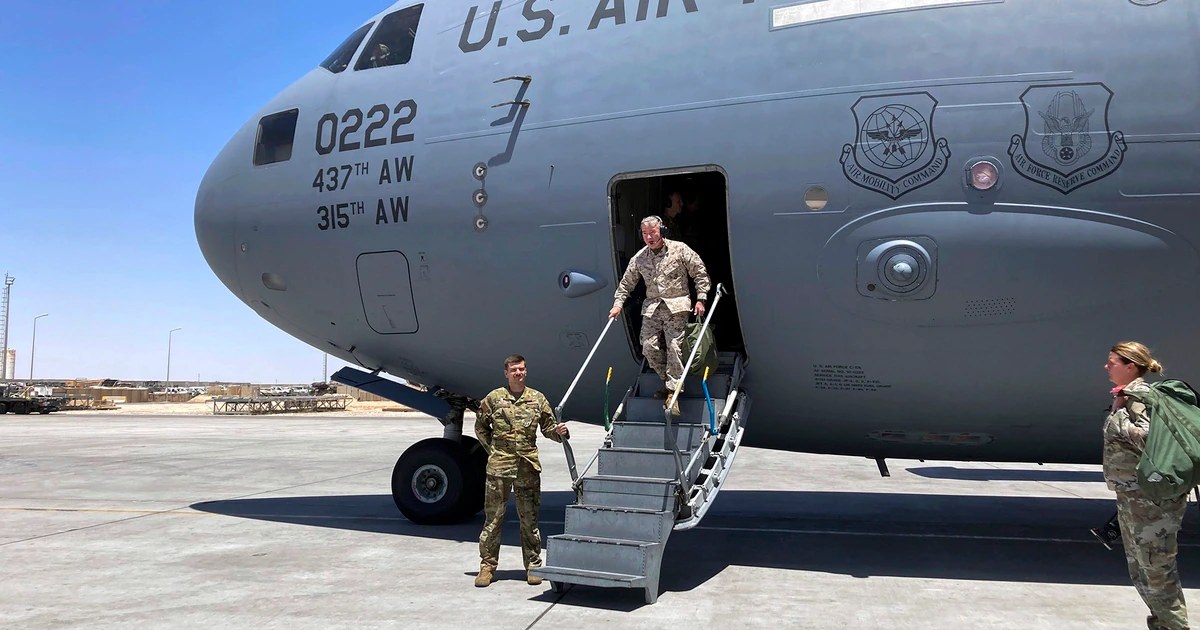
BAGHDAD — A month after an explosives-laden drone targeted U.S. forces at an Iraq base, the top American commander for the Middle East says finding better ways to counter such attacks is a top priority, and the United States is still behind the curve on solutions.
Marine Gen. Frank McKenzie told reporters traveling with him that the use of small drones by Iranian-backed militias is only going to grow in the next few years. He spent the day in Iraq on Thursday, but for security reasons, media accompanying him were not allowed to report on his visit until after he left the region.
The drones, which are cheap and easy to buy, are often difficult to detect and problematic to defeat. McKenzie said the U.S. must find more ways to counter their use by America’s enemies in the Middle East and elsewhere.
“We’re working very hard to find technical fixes that would allow us to be more effective against drones,” McKenzie said. Efforts are underway, he said, to look for ways to cut command and control links between a drone and its operator, improve radar sensors to quickly identify the threat as it approaches, and find effective electronic and kinetic ways to bring them down. He added that fencing and high netting can also be used as protective measures.
“We’re open to all kinds of things” he said. “The Army is working it very hard. Still, I don’ t think we’re where we want to be.”
/cloudfront-us-east-1.images.arcpublishing.com/mco/ESVSJJGJ7FBZPB2JGBXFD3KODI.jpg)
In mid-April, an drone targeted U.S.-led coalition forces near a northern Iraq airport, causing a large fire and damage to a building. There were no casualties.
No one has claimed responsibility for the attack. The U.S. has blamed Iran-backed militia groups for previous attacks, most of them rockets, that have targeted the American presence in Baghdad, the capital, and military bases across Iraq.
Overall attacks against coalition troops have been frequent since a U.S.-directed drone strike killed Iranian Gen. Qassem Soleimani near the Baghdad airport last year. Iraqi militia leader Abu Mahdi al-Muhandis was also killed in the attack. The strike drew the ire of mostly Shiite Iraqi lawmakers and prompted parliament to pass a nonbinding resolution to pressure the Iraqi government to oust foreign troops from the country.
The Biden administration has resumed strategic talks with Baghdad, initiated under President Donald Trump, in which the future of U.S. troop presence in Iraq is a central point of discussion. McKenzie and others have expressed optimism that the U.S. will maintain a military presence in the country
The militia groups, McKenzie said, are frustrated because there had been some hope that U.S. forces would leave Iraq, particularly in the wake of the Soleimani strike.
“They believe they can carry out attacks at a fairly low level that won’t provoke a response, yet will create enough friction that will eventually induce us to leave,” McKenzie told reporters traveling with him. “I think it’s a dangerous situation.”
/cloudfront-us-east-1.images.arcpublishing.com/mco/IMDN4URFNNBJXAADN7WK4SXXDQ.jpg)
He said he believes the U.S.-led coalition still has work to do in Iraq to help defeat the Islamic State group, which maintains some presence in western and northern Iraq. But he said the Iraqi security forces have done a good job battling IS.
After spending Thursday in Iraq, McKenzie was in Syria on Friday, meeting with U.S. and partner commanders and forces at four different bases.


Be the first to comment